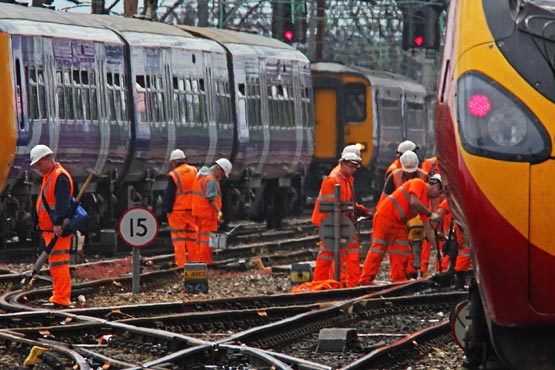|
I can’t get to grips with self-checkout machines - there are just too many variables. Do I put the item in a bag after scanning or on the weighing plate? Should I just juggle with it? And what am I meant to do when the bloody thing locks-up altogether and bleeps at me incessantly, whilst the chorus of tutting behind gets louder? Well we will all have to get used to such irritations soon as smartphone scanners are heading for a worksite near you, as well as new hi-tech Sentinel cards.

Once upon a time, suitability to work trackside involved totting up the number of eyes and limbs a person had at their disposal. The right to pass through access gates came with the issuing of a black overcoat - standard kit for yesteryear’s rail worker, predecessor to the high-vis vest. Competency was determined by the person in charge. For red zone working, orange PTS certificates appeared in the early Nineties, along with a market in forgeries. It wasn’t until 1999 that the current track safety card saw its first outing, with qualifications formally recorded on the central Sentinel database and available for on-site interrogation via a phone hotline.
But the advent of mobile internet technology means all this is very last century. During the course of this summer, a new Sentinel service will be rolled out which aims to ensure that no-one performs a safety-critical task unless they have been trained and assessed as competent. To deliver this assurance, new smartcards will be issued - each lasting up to five years - providing 100% authentication of all credentials, automatically synchronised with the database and readable using Android or iOS phones. The claim is that this will speed up checking, eliminate the need for paper counterparts (about time), allow changes to be registered instantaneously and reduce administrative burdens on COSSs and site managers by replacing paper forms with electronic data transfer.
Sounds great doesn’t it? But one of the underlying issues here is what the briefing materials call “adaptability to future needs”. As most mobiles are now equipped with GPS, it would be straightforward for the location of each Sentinel card holder to be logged and recorded on the database every time their card is checked, together with the time and date. If a second scan was taken when they leave their worksite, this gives Big Brother the opportunity to know immediately where each card holder has been and how many hours they have worked. This could become a very powerful management tool, with clear implications for the individual in terms of privacy and personal freedom. Many would regard this as a good thing - allowing alerts to be raised when excessive working hours are being racked up or if a worker is persistently reporting for duty having travelled ridiculous distances. Some will have real cause to fear that kind of monitoring.
|
| Some will have real cause to fear that kind of monitoring. |
|
Such usages are clearly on Network Rail’s radar: “We will explore new and expand existing services and capabilities that will derive real cost, efficiency and safety value to you from the information that Sentinel can access”, it states. Amongst the benefits listed on the ubiquitous Powerpoint presentation are improved “management of risk due to fatigue” and support for “safer lone working”.
New Sentinel is intended to cut industry costs, which is probably the true driving force behind it. Instead of invoices being inefficiently sent for individual cards, there will be tiered subscription rates depending on the numbers employed by each sponsor. Overall, the expenditure associated with compliance to all the Sentinel requirements will be significantly lower, Network Rail claims. No charge will be levied for Track Visitor Permits, unlike now. There will continue to be a 24/7 hotline as a back-up in case of poor data connectivity; this will use a low/no-cost 033 number rather than the current pricey 0870 line. The move will also result in “Tightening the control of access to our sites - without reducing productivity - to levels that are common practise in other sectors and other parts of the construction industry.”
The change will see an end to Capita’s involvement with Sentinel as the tender for the new system has been awarded to MITIE, a “strategic outsourcing company”, in partnership with software solutions provider Reference Point - the firm behind similar industry ID schemes such as Transport for London’s LUCAS card.
It will be fascinating to see how the unions respond to all this. On the face of it, lower costs and safety benefits should not be sniffed at. But if it results in restrictions being placed on an individual’s right to work where and when they choose - subject to statutory limits - then some will see it as further unacceptable erosion of personal freedoms. Irrational fears over security and the national embarrassment that is health and safety have done enough of that already.
|